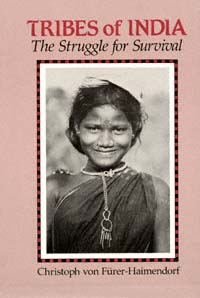
University of California >>
Free eBook (PDF) >>
Summary & Contents >>
The vulnerability of tribal populations to exploitation by minor government officials, as well as moneylenders, landlords, and other agents of vested interests, can largely be traced to their illiteracy and general ignorance of the world outside the narrow confines of their traditional environment. Their inability to cope with the many novel forces impinging nowadays on tribal villages and on an economy which had remained virtually unchanged for centuries is by no means due to any innate lack of intelligence. As long as they operate within their familiar atmosphere, tribals evince as much perspicacity, skill, and even true wisdom as any other population, but as soon as they are faced by social attitudes rooted in a different system they become insecure and often behave in a manner detrimental to their own interests. Brought up in a system in which all communications are by word of mouth, and hence used to trusting verbal statements, they get confused by constant reference to documents and written rules, which increasingly determine all aspects of rural life. Unable to read even the receipt given by an official and obliged to put their thumb impressions on documents which they cannot understand, they are easy victims of any fraud or misrepresentation which more educated exploiters are likely to devise.
It is obvious, therefore, that a modicum of literacy is indispensable as a first step towards enabling tribals to operate within the orbit of the advanced communities dominating the economic and political scene. The disadvantages under which illiterate tribals labour are multiplied in the case of those who do not even speak and understand the language of the dominant population, and hence cannot communicate with officials except through better-educated fellow tribesmen acting as interpreters.
Source: Tribes of India (pp. 126-7)
Address : https://publishing.cdlib.org/ucpressebooks/view?docId=ft8r29p2r8&chunk.id=d0e2780&toc.depth=1&toc.id=&brand=ucpress
Date Visited: 19 January 2022
[Bold typeface added above for emphasis]
Excerpt: Preface by by Christoph von Fürer-Haimendorf
[…] When in 1976 I retired from the Chair of Asian Anthropology at the University of London and could devote more time to fieldwork, I decided to undertake a systematic investigation of social and economic changes affecting the tribal societies which I had studied in the 1940s. A grant from the Social Science Research Council of Great Britain, as well as subsidiary awards from the Leverhulme Trust Fund and the Wenner-Gren Foundation for Anthropological Research, provided the material basis for this project, which included also the funding of parallel research by my young colleague Dr. Michael Yorke. It is to be hoped that in future years Michael Yorke will return to the same tribal area, and thus extend the period of observation from forty to sixty or perhaps even seventy years. The School of Oriental and African Studies, which provided the administrative framework for the project, will preserve the documentation, storing all my field notebooks and diaries from the years 1940 to 1980, as well as photographic data.
Financial assistance from the Indian Council of Social Science Research enabled Mr. Jayaprakash Rao of the Osmania University in Hyderabad to participate in the project by undertaking a detailed study of the present condition of the Konda Reddis, a tribe of Andhra Pradesh which figured prominently in my research forty years earlier. His contribution to the volume (chapter 10) provides an Indian view of the problems of tribal populations. Both he and Michael Yorke, the author of chapter 9, are solely responsible for their contributions, which do not necessarily coincide in all details with my observations.
This book is the third of three volumes which have so far resulted from the project, the first two being The Gonds of Andhra Pradesh: Tradition and Change in an Indian Tribe (Delhi and London, 1979) and A Himalayan Tribe: From Cattle to Cash (Delhi and Berkeley, 1980), and it is planned that additional publications originating from the project will follow in due course.
Source: Fürer-Haimendorf, Christoph. Tribes of India: The Struggle for Survival. Berkeley: University of California Press, c1982 1982. http://ark.cdlib.org/ark:/13030/ft8r29p2r8/
Address : https://publishing.cdlib.org/ucpressebooks/view?docId=ft8r29p2r8&chunk.id=d0e36&toc.depth=1&toc.id=&brand=ucpress
Date Visited: 20 February 2025
See also
Adverse inclusion | Casteism | Rural poverty
Childhood | Tribal Children’s Right to Education in India
Demographic Status of Scheduled Tribe Population of India (Census figures 2011)
Fact checking | Figures, census and other statistics
Human Rights Commission (posts) | www.nhrc.nic.in (Government of India)
Search tips | Names of tribal communities, regions and states of India
“What is the Forest Rights Act about?” – Campaign for Survival and Dignity
“Who are Scheduled Tribes?” – Government of India (National Commission for Scheduled Tribes, NCST)
Learn more
Adivasi Academy & Museum of Adivasi Voice at Tejgadh
Appropriate education for Adivasi children – the Vidyodaya School model
Childhood | Children’s books | Childrens rights: UNICEF India | Safe search
Childrens rights: UNICEF India
Convention on the Rights of the Child: The children’s version | Unicef
eBook | Background guide for education
eBook | Free resources for rural education and health care – Unicef
eBook | “Where the mind is without fear”: Tagore, Gitanjali and the Nobel Prize
Education and literacy | A View of Higher Education in India | Right to education
Forest Rights Act (FRA) | Illegal mining
Health and nutrition | Recommendations by the Expert Committee
Multi-lingual education & Central Institute of Indian Languages (CIIL)
Multilingual education is a pillar of intergenerational learning – Unesco
People’s Linguistic Survey of India | Volumes (PLSI) | PeoplesLinguisticSurvey.org
Rabindranath Tagore: a universal voice – Unesco
RSV School & Museum of Santal Culture (West Bengal)
Scheduled Tribes (ST) | Success story
Tribal Children’s Right to Education in India
Unesco | Unicef | Unicef India | United Nations
United Nations International Days and Weeks
Video | “Nations don’t make us human – languages make us human”: Ganesh Devy
Women | Safe search | President Droupadi Murmu on women’s empowerment